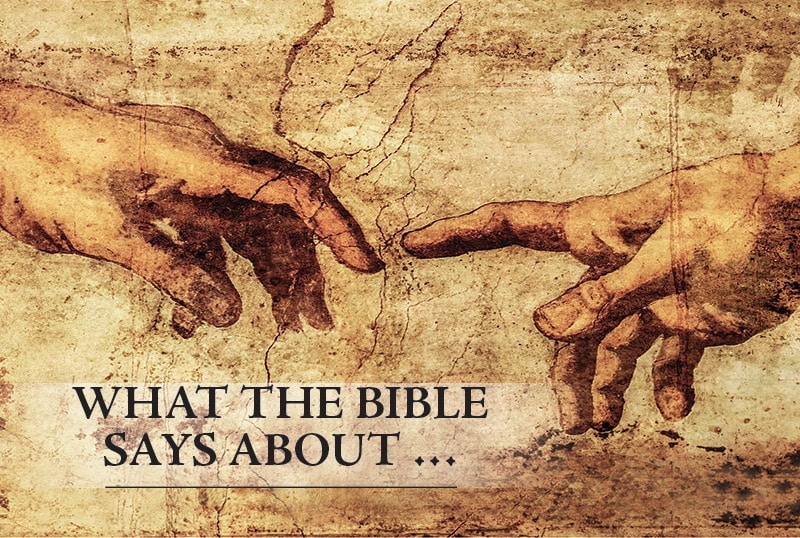In the creation account in Genesis 1 and 2, God deliberately distinguished human beings from all other beings as His crowning work. He created humans only after everything else, setting the stage for man’s grand entrance. He assigned humans dominion over the earth (Gen. 1:28), breathed the breath of life into them (Gen. 2:7), and created them in His image (Gen.1:27).
The divine image marks humans as God’s unique possessions. Everything belongs to God (Deut. 10:14; Job 41:11; Ps. 24:1) by right of creation, yet in Mark 12:13–17, Jesus appealed to the image of God in humans to establish that God stakes a unique claim on them. Jesus said that Caesar’s image on the coin indicated that the coin belonged to Caesar. He added, “Render to Caesar the things that are Caesar’s and to God the things that are God’s.” The implication is that Jesus’s hearers were to give themselves to God since His image was stamped on them. Humans are to acknowledge divine ownership by living under His lordship.
Rejecting the Sinful “Isms”
The presence of the divine image affirms the inherent dignity of all people and calls for the rejection of all forms of racism — the belief that some races are inherently superior or inferior to others. All humans are derived from Adam and Eve, so people of all ethnicities equally bear the image of their Creator. Ironically, too often those who argue the loudest for the historicity of Adam and Eve are the slowest to recognize the image of God in other ethnicities.
The presence of the divine image calls for the rejection of all forms of sexism — the belief that one gender is inherently superior to the other. God created males and females equally in His image (Gen. 1:27) and charged them equally to have dominion over the earth (Gen. 1:28). Men and women equally share in bearing a tarnished image and in the offer of restoration through Christ.
Although men and women have different roles in reproduction, society, and the church, they possess equal value and dignity. Even when a given role involves subordination, the image is not compromised. Jesus subordinated Himself to the Father, but His essential deity remained.
True Humanism
Whereas the presence of the divine image in humans prohibits all forms of racism and sexism, the same is not true of speciesism — the denial that human beings have greater value and a higher moral status than animals.
In this regard, Christianity is the true humanism. Humanism is a worldview that emphasizes the value and dignity of human beings. Christianity does precisely that. The divine image imbues every human being objectively with dignity and value. The psalmist highlighted this truth: “Yet you have made him (man) a little lower than the heavenly beings and crowned him with glory and honor. You have given him dominion over the works of your hands; you have put all things under his feet” (Ps. 8:5–6).
Secular humanism, on the other hand, with its denial of God’s existence, is unable to justify its affirmation of man’s dignity and worth. If humans are merely an accidental, random combination of molecules, then arguing that humans are special is undermined. Without God to assign objective values, humans can be no more valuable than anything else.
Christians, as stewards of God’s creation, should be concerned about the ethical treatment of animals but must categorically reject the remark made by the co-founder and president of People for the Ethical Treatment of Animals: “A rat is a pig is a dog is a boy.” The image of God in human beings repudiates the claim that a rat and a boy are moral equivalents. But without God, that claim is difficult to deny. Christianity, not secular humanism, holds human beings in high esteem.
The image of God ensures the dignity and value of the unborn and the cognitively impaired. Each is a member of the human species — possessing human nature, and, thus, the divine image. That image is inherent to human nature and is not limited to any person’s actualized capacities. Just as an apple tree is an apple tree by nature, regardless of whether it produces apples, the unborn and cognitively impaired possess human nature, bear the divine image, and have dignity and value — irrespective of their cognitive status. These persons deserve the same rights and protection afforded to other human beings.
A Basis for the Urgency of Evangelism
The divine image carries implications for the church’s evangelistic and missional efforts.
Because all people bear the divine image, all people are accountable to God and are possible recipients of a restored image in Christ. Regardless of how deep a person has fallen into sin, that person remains an image-bearer and is a candidate for image restoration. In God’s sight, all people are unworthy, but none is worthless.
The presence of the divine image further assures Christians that the gospel message is meaningful to the unbeliever — that there is a point of contact for the gospel in every person.
Since God’s goal for the redeemed image-bearer is to be conformed to the image of Christ, the Christian should use every means of grace that God provides to progress toward Christlikeness (Eph. 5:1–2; Col. 3:9–10).
— Walter Johnson is a recently retired dean of the College of Christian Studies at North Greenville University, where he taught and served for 32 years.
